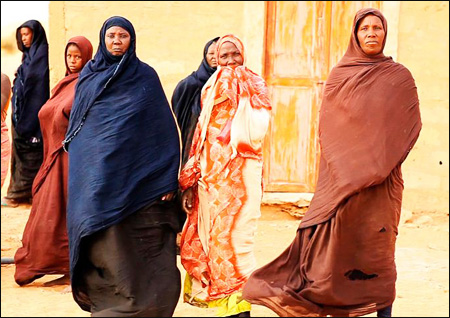I was like an animal living with animals: woman
 The Universal Declaration of Human Rights was adopted at the third General Assembly session of the United Nations on Dec. 10, 1948. At the outset, it came as repentance for infringements on human rights during World War II, but included the official abolition of slavery.
The Universal Declaration of Human Rights was adopted at the third General Assembly session of the United Nations on Dec. 10, 1948. At the outset, it came as repentance for infringements on human rights during World War II, but included the official abolition of slavery.
Now, there is no country with slavery on this planet — at least legally. However, there are still people who have been “born” as slaves, not based on human trafficking, in the Islamic Republic of Mauritania in West Africa.
One of them is Moulkheir Mint Yarbe, who was born a slave in the northern deserts of Mauritania. As a child, she got up before dawn and toiled into the night, pounding millet to make food, milking goats, cleaning and doing laundry without knowing her parents’ names. She has never been paid for her work.
Even before her first period, her “master” took her out to the goat fields near his home and raped her. He forced her to go back work when she wanted to give a proper burial to her dead daughter, barely old enough to crawl. “I was like an animal living with other animals,” she cries.
Moulkheir’s life shows the reality of slavery in Mauritania. Mauritania became the last country in the world to legally abolish slavery in 1981. And it didn’t make slavery a crime until 2006.
According to CNN, 10 to 20 percent of Mauritania’s 3.4 million of population are enslaved. Why has slavery continued in Mauritania long after it was abolished elsewhere?
First of all, Mauritania is a huge and largely empty country in the Sahara Desert. Only 0.2 percent of the land is arable due to the lack of water. This makes it difficult to enforce any laws, including those on slavery. A branch of al Qaeda has found it an attractive hiding place, and the country’s vastness also means that rural and nomadic slave owners are hidden from view.
Secondly, religion and racial custom influenced the system. Arab slave traders in the region that would become the ruling class of Mauritania capture darker-skinned people from sub-Saharan Africa and force them to work without pay. “You can trace the slavery back to 2,000 years ago,” said Kevin Bales, author of “Disposable People,” which is about slavery.
Finally, the biggest problem is that most slaves aren’t aware that they are enslaved. They believe it is their destiny to work as slaves, without pay, and sometimes feel pride in working for their “high class” masters. Many families have been torn apart as slave masters gave a young slave as a present traditionally.
The Mauritanian government has done little to combat slavery and in interviews with CNN denied that the practice exists. “All people are free in Mauritania and this phenomenon (of slavery) no longer exists,” said Brahim Ould M’Bareck Ould Med El Moctar, the country’s minister of rural development. <Korea Times/Lee Ji-eun>



